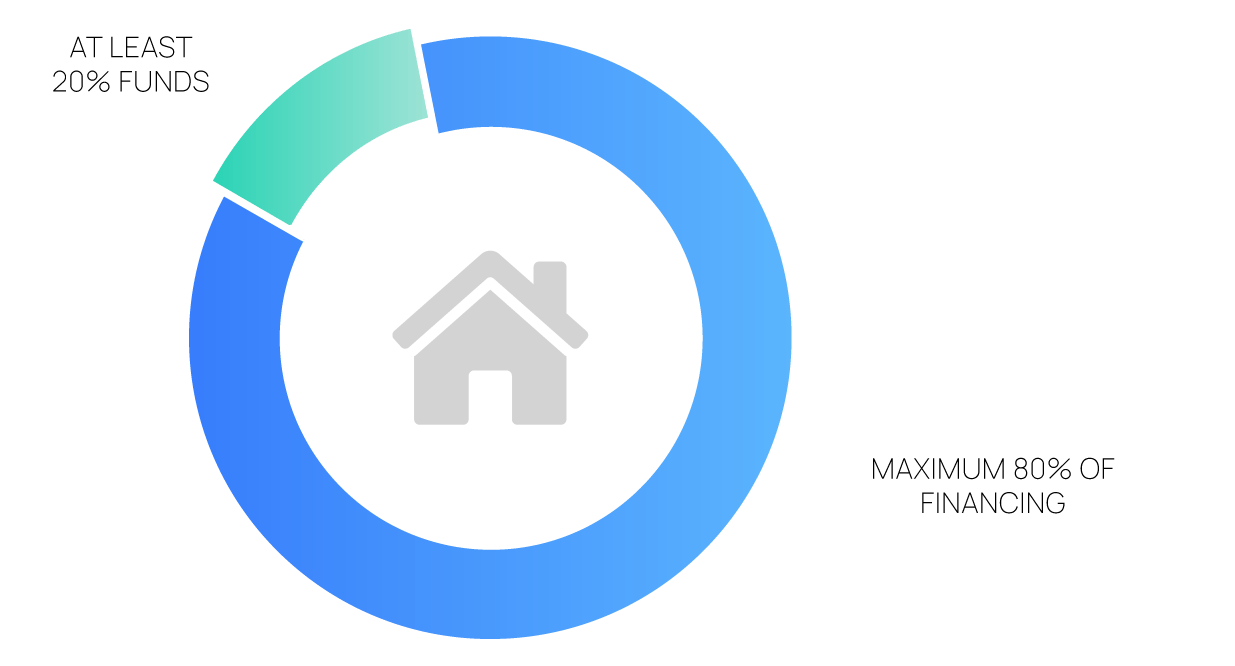Owning real estate in Switzerland – what you need to know
In Switzerland, buying a property requires good knowledge of the legal and financial niceties of the market. From the importance of your income level to the constitution of own funds, Resolve gives you an overview of the main factors you should consider when becoming a property owner.
In Switzerland, is it better to buy or rent?
Owner or tenant? Compared with neighboring countries, even though the number seems to be increasing, the proportion of homeowners in Switzerland remains relatively low, However, specialists agree that becoming a property owner is less expensive in the long term than renting.
The low percentage can be explained by several factors, including financial difficulties in first place:
- property prices are high
- significant revenue is required
- getting on the property ladder requires access to considerable own funds
The process itself can also be a stumbling block for those who wish to become property owners:
- the jargon used is complex and difficult to understand
- it is difficult to consolidate information
- calculations are complicated
- the gamble sometimes seems too risky (mortgage rates can go up and resale can be problematic)
However, if you receive the right support, owning real estate and obtaining a mortgage loan can be simple and particularly beneficial.
Homeowner or tenant, both have their advantages and disadvantages. Owning your own home means you are free of the restrictions of renting; you will be able to decorate or improve your home as you wish and you will not be at risk of rent rises or your landlord terminating your lease. It can also make you eligible for tax benefits. However, it also requires greater commitment as you will be in debt for a long time and you will subject to a new tax, the tax on the rental value of the property.
Who can buy a property in Switzerland?
Buying real estate in Switzerland is not for everyone. The dream of owning their own home remains largely inaccessible for most of the middle class, especially in highly sought-after or densely populated regions such as Geneva, where 81% of the population rent (compared to around 64% for Switzerland as a whole in 2021).
Due to financial limitations combined with restrictive market prices, it is rare for anyone under 30 to own real estate in Switzerland. According to Crédit Suisse, the average age of property owners is around 58 years. The age of purchase is estimated by experts to be in the range of 35-45 years.
Your personal and professional situation can also affect the amount you can borrow and, therefore, whether you can afford to buy or not. Lenders can apply different criteria depending on the type of work you do, your nationality, and your age.
If you would like to discover your buying capacity with all the lenders on the market, our calculator considers all of these criteria and provides you with accurate information in just a few clicks.
What level of income is required to own real estate in Switzerland?
Income is a key factor in determining the maximum amount you can borrow. Each property and its associated mortgage loan involve running costs:
- interest
- the amortization of the mortgage (the staggered repayment of a part of the loan)
- maintenance costs
- the property charges
All of these housing costs must not usually exceed a third (33%) of your household income.
There are, however, exceptions in which certain lenders accept a slightly higher ratio (up to 40%) depending on, for example, the age or status of borrowers, their combined income, subsistence allowances, or the amount of the loan.
It should be noted that existing expenses, such as an automobile lease, must be taken into account in the calculation.
For example, for a property worth 1,000,000 CHF, the combined income of the borrowers must be around 180,000 CHF.
How do you finance a property in Switzerland?
One of the most important points concerns own funds. When you wish to own your primary residence in Switzerland, you are usually asked to provide a personal contribution of at least 20% of the purchase price. This means that a financial institution will fund at most 80% of the price of the property. Without this personal contribution, it is very difficult to acquire an apartment or house, even if you have sufficient income. This rule applies in all banks and all cantons.
Repartition between your own funds and your mortgage loan
An additional restriction also applies in most cases – at least 10% of these funds must come from your liquid assets (equity), such as savings, the third pillar, life insurance, donations, securities, etc. The remaining 10% may come either from your liquid assets or your second pillar (also called “BVG”).
As well as the 20% own funds, you will also need to budget for notarial fees. They vary according to the notary and the canton. They cannot be financed by the bank nor some from your second pillar and must be covered by your liquid assets. They can represent 3-5% of the value of the property and, therefore, must not be ignored.
If we go back to the previous example, for a property worth 1,000,000 CHF, you will need to budget for a contribution of 23-25% in own funds or between 230,000 and 250,000 CHF.
How can I best prepare for purchasing real estate in Switzerland?
Buying real estate is one of life’s major purchases, often the most important, financially-speaking. It is, therefore, essential to prepare as well as possible and to get the best advice.
1. Know your buying capacity
The first question you will need to answer, even before you start looking for the property of your dreams, is what is the maximum price you can pay for a property.
Your buying capacity will depend on several factors:
- The own funds that you can contribute to the project
- Your borrowing capacity, which depends on your income
- The financial institution you decide to take out a mortgage loan with
- The canton in which you buy
- How you intend to use the property
Some property brokers will even ask you to provide proof of funds before you can make an offer. Do not get caught out and anticipate this request. Resolve can provide proof of funds in just a few clicks.
Assess your buying capacity in just a few clicks
2. Choosing the type of property and its location
It is essential to decide on the type of accommodation you are looking for and which features are important to you before you rush into your research. Decide if you want a new build or an existing property. Location is also important as it influences the price. In general, the further you are from the city, the lower the price. Prices per m2 are around 6,000 CHF on average in Switzerland, but can quickly reach 10,000 CHF per m2 in the major cities. As an indication, the sales price of 80% of houses on the Swiss market is between 420,000 and 2,900,000 CHF. Most apartments are sold for between 298,000 and 1,665,000 CHF.
3. Preparing a savings plan
As you have seen, you will quickly need to consider saving to have enough own funds available for the day you wish to invest in real estate. The pension associated with the third pillar can be an excellent solution. Also, one in three Swiss nationals put aside up to 1,000 francs per month to become real estate owners. According to a study by Swiss Life, a Swiss family must save for, on average, eight years before they purchase a property.
4. Finding financing
Once you have checked your buying capacity, found a property, and constituted your personal contribution, you need to get the best mortgage for your project. Here, various possibilities exist:
- variable rate mortgage
- fixed rate mortgage
- Saron mortgage
- combined mortgage
The mortgage models differ in their flexibility and the level of risk involved. A painstaking analysis is required to ensure that, even after retirement or in the event of a receiving a pension (incapacity or death), the financial burden will remain bearable for continuing to live in the property in question.
Finding the best financing can be complicated and time-consuming as it requires knowledge of mortgage financing and being aware that each institution accepts clients and decides to grant mortgages according to its own rules. To easily find your way on the real estate market and get the best loan, Resolve advisors support you and find the most appropriate financial solution for your needs and requirements.


.png?ixlib=gatsbyFP&fit=max&auto=compress%2Cformat&q=50&w=8192)
.png?ixlib=gatsbyFP&fit=max&auto=compress%2Cformat&q=50&w=8192)
